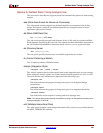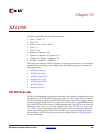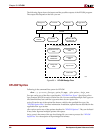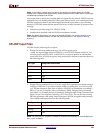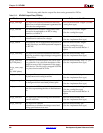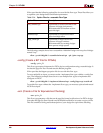
Development System Reference Guide www.xilinx.com 343
XFLOW Input Files
R
Note: If you specify a design name only and do not specify a flow type or option file, XFLOW
defaults to the –implement flow type and fast_runtime.opt option file for FPGAs and the –fit flow type
and balanced.opt option file for CPLDs.
You do not need to specify the complete path for option files. By default, XFLOW uses the
option files in your working directory. If the option files are not in your working directory,
XFLOW searches for them in the following locations and copies them to your working
directory. If XFLOW cannot find the option files in any of these locations, it issues an error
message.
• Directories specified using XIL_XFLOW_PATH
• Installed area specified with the XILINX environment variable
Note:
By default, the directory from which you invoked XFLOW is your working directory. If you
want to specify a different directory, use the –wd option described in “–wd (Specify a Working
Directory)”.
XFLOW Input Files
XFLOW uses the following files as input:
• Design File (for non-synthesis flows)—For all flow types except
–synth, the input design can be an EDIF 2 0 0, or NGC (XST output) netlist file. You
can also specify an NGD, NGO, or NCD file if you want to start at an intermediate
point in the flow. XFLOW recognizes and processes files with the extensions shown in
the following table.
• Design File (for synthesis flows)—For the –synth flow type, the input design can be a
Verilog or VHDL file. If you have multiple VHDL or Verilog files, you can use a PRJ
or V file that references these files as input to XFLOW. For information on creating a
PRJ or V file, see “Example 1: How to Synthesize VHDL Designs Using Command
Line Mode” or “Example 2: How to Synthesize Verilog Designs Using Command Line
Mode” of the Xilinx Synthesis Technology (XST) User Guide. You can also use existing
PRJ files generated while using Project Navigator. XFLOW recognizes and processes
files with the extensions shown in the following table.
Note:
You must use the –g option for multiple file synthesis with Synplicity or Leonardo Spectrum.
See “–synth” for details.
File Type Recognized Extensions
EDIF .sedif, .edn, .edf, .edif
NCD .ncd
NGC .ngc
NGD .ngd
NGO .ngo
File Type Recognized Extensions
PRJ .prj
Veri log .v
VHDL .vhd



